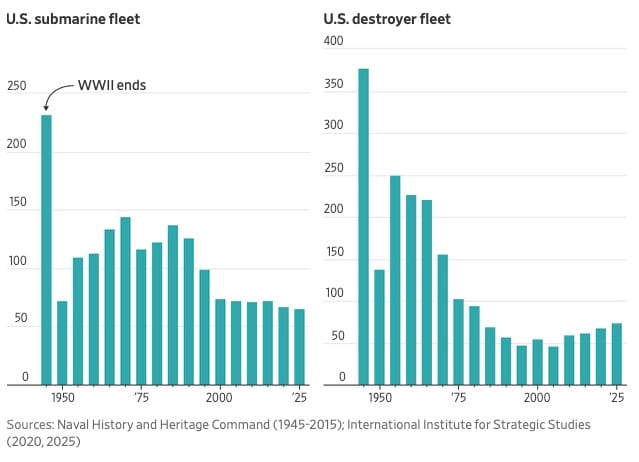August 4 2025
Trump Fires BLS Chief; Corporate Tax Windfall; Democrats Flee TX, Governor Threatens Ouster; Navy Struggles Maintaining Ships; China Squeezes Defense

Trump Fires Labor Statistics Chief Over Weak Jobs Report, Alleges 'Rigged' Numbers
Corporate America Reaps Billions in Cash Windfall From New Tax Law
Texas Democrats Flee State to Block GOP Redistricting Plan; Texas Governor Threatens to Oust Democrats After Walkout
As Fleet Shrinks, U.S. Navy Struggles to Maintain Ships, Raising Specter of Unpreparedness
China Squeezes Western Defense Firms by Limiting Critical Mineral Exports
Newsletter sponsor

1. Trump Fires Labor Statistics Chief Over Weak Jobs Report, Alleges 'Rigged' Numbers
President Trump on Friday fired Bureau of Labor Statistics Commissioner Erika McEntarfer after the July jobs report showed that hiring stalled this spring amid his tariff blitz and deportation crackdown. The BLS estimates a mere 73,000 jobs were added last month, almost all in healthcare and social assistance. It also revised down gains for May and June by a combined 258,000, to a total of 33,000 new jobs, one of the biggest downward revisions in years. Mr. Trump sniffs a deep-state conspiracy. “Today’s Jobs Numbers were RIGGED in order to make the Republicans, and ME, look bad,” the president huffed on Truth Social. The BLS commissioner has traditionally been a nonpartisan post, and the Senate confirmed Ms. McEntarfer 86-8 last year. Yet Mr. Trump asserted…that Ms. McEntarfer “faked the Jobs Numbers before the Election to try and boost Kamala’s chances of Victory” and revised down the numbers after the election by 818,000. The truth is that the jobs numbers have become more volatile in recent years because of declining business survey response rates. It’s similar to the problem political pollsters face getting representative samples. And Mr. Trump’s trade and immigration policies may be making monthly data less reliable. It helps to understand how the BLS produces its monthly jobs report. The bureau surveys some 631,000 workplaces by a variety of media, including phone, web and even fax. Many businesses don’t respond every month, but the BLS continues to collect data and revise its findings over the next two months. The survey’s overall response rate has declined to 43% from 60% before the pandemic, and small businesses are less likely than bigger ones to respond, especially in the first month. The jobs estimate can also be off in either direction by 136,000 in any given month because of statistical chance. Such variations tend to even out over several months.

WSJ
2. Corporate America Reaps Billions in Cash Windfall From New Tax Law
The magnitude of the cash savings from this summer’s federal tax legislation is starting to take shape at America’s biggest companies. AT&T recently said it expected $1.5 billion to $2 billion in cash tax savings this year, due to provisions in the tax-and-spending law dubbed the One Big Beautiful Bill Act. The high end of the range is equivalent to an 11% boost to analyst estimates of 2025 free cash flow before the law was enacted. AT&T estimated annual cash tax savings of $2.5 billion to $3 billion in both 2026 and 2027. In short, changes like allowing upfront depreciation of assets and immediate expensing of research-and-development expenses will bring swift windfalls to American corporations but also lasting tailwinds. This in turn has provided incremental fuel to stock markets, a counterweight to risks from tariffs and other policy uncertainty.
WSJ
3. Texas Democrats Flee State to Block GOP Redistricting Plan; Texas Governor Threatens to Oust Democrats After Walkout
Democratic members of the Texas House of Representatives left the state on Sunday in a last-ditch attempt to stop Republicans from adopting an aggressively redrawn congressional map. Their absence is expected to prevent the House from reaching the quorum needed to hold a vote this week. The walkout was a sharp escalation in the bitter partisan clash over a mid-decade redistricting in Texas that was requested by President Trump. Republicans in the State Legislature were rapidly moving forward, with the map — drawn to flip five Democratic congressional districts to favor Republicans — being passed out of two committees over the weekend. Hours after the Democrats departed, Gov. Greg Abbott responded with a further escalation, declaring that their walkout amounted to an “abandonment or forfeiture of an elected state office.” If they do not show up for a scheduled floor debate on the maps on Monday, Mr. Abbott said, he will invoke a legal opinion by the Texas attorney general and take steps to “remove the missing Democrats from membership in the Texas House.” Such a move would almost certainly be challenged in court.
NYT
4. As Fleet Shrinks, U.S. Navy Struggles to Maintain Ships, Raising Specter of Unpreparedness
The USS Helena was preparing to leave dock after more than six years of stop-start repairs when a young sailor was electrocuted and died. His death further delayed the return to action of a submarine that epitomizes the Navy’s struggles to maintain its fleet. Sonar technician Timothy Sanders had told his mother several times that he was concerned substandard repair work on the submarine would get someone hurt. A Navy report concluded that he died last May after inadvertently touching an electrical source left uncovered by repair workers, his mother said. President Trump has called attention to U.S. shortcomings in building new naval vessels. The Helena’s history of costly, sometimes chaotic repairs highlights another problem: America is also struggling to fix the ships and submarines it already has. While Sanders’ death is an extreme example of what can go wrong in U.S. shipyards, the shipbuilding and repair industries have long complained that a lack of experienced staff has led to mistakes and delays. Limited dry dock capacity and aging equipment are also challenges. The problems reflect a lack of investment in public yards after the Cold War-era and a broader decline in the American maritime industry. Those issues are now coming into sharp relief amid a greater focus on naval preparedness. Naval experts are concerned that tardy or substandard work in repair yards will keep ships and submarines out of action during a potential war in Asia—a conflict expected to be fought in large part at sea. Maintenance delays are already causing disruptions. The Marine Corps, for instance, has been prevented from deploying and training on schedule because of the poor upkeep of amphibious warships. One submarine, the USS Boise, will have been out of action for 14 years before it is scheduled to head back to sea in 2029 after more than $1.2 billion worth of maintenance work. Getting vessels back to sea quickly matters more than ever because the U.S. fleet has shrunk. In the late 1980s, the Navy had some 600 vessels. Today it has about 295.

WSJ
5. China Squeezes Western Defense Firms by Limiting Critical Mineral Exports
China is limiting the flow of critical minerals to Western defense manufacturers, delaying production and forcing companies to scour the world for stockpiles of the minerals needed to make everything from bullets to jet fighters. Earlier this year, as U.S.-China trade tensions soared, Beijing tightened the controls it places on the export of rare earths. While Beijing allowed them to start flowing after the Trump administration agreed in June to a series of trade concessions, China has maintained a lock on critical minerals for defense purposes. China supplies around 90% of the world’s rare earths and dominates the production of many other critical minerals. As a result, one drone-parts manufacturer that supplies the U.S. military was forced to delay orders by up to two months while it searched for a non-Chinese source of magnets, which are assembled from rare earths. Certain materials needed by the defense industry now go for five or more times what was typical before China’s recent mineral restrictions, according to industry traders. One company said it was recently offered samarium—an element needed to make magnets that can withstand the extreme temperatures of a jet-fighter engine—for 60 times the standard price. That is already driving the cost of defense systems higher, say suppliers and defense executives.
WSJ
Editors note: see my previous article on critical minerals. The US needs a Manhattan Project to reshore rare earth minerals processing - this is the single most important trade issue facing the US today.

August 4, 1790: Alexander Hamilton creates Coast Guard to intercept smugglers
The Coast Guard’s first job was tariff enforcement. Originally called the “Revenue Marine” and then the “Revenue Cutter Service,” the Coast Guard was one of Hamilton’s many bold ideas for funding the U.S. federal government, which was mired in debt after the costly Revolutionary War. There was no federal income tax at the time, and tariffs on imported goods were the chief source of revenue for the fledgling government. But smugglers evaded tax collection by landing ships at night or by bribing customs officials.

Found a mistake? Have a news tip or feedback to share? Contact our newsroom using the button below:
citizen journal offers three flagship products: a daily national news summary, a daily Kansas news summary, and local news and school board summaries from 12 cities across Kansas. Each issue contains 5 paragraph-length stories that are made to be read in 5 minutes. Use the links in the header to navigate to national, kansas, and local coverage. Subscribe to each, some, or all to get an email when new issues are published for FREE!
Sponsors (click me!)





See the citizen journal Podcast! Released on Apple, Spotify and YouTube around 10a CST.
Sources
- https://www.wsj.com/opinion/trump-claims-the-jobs-report-was-rigged-was-it-employment-27df60f8?mod=hp_opin_pos_1
- https://www.wsj.com/finance/investing/cash-windfall-from-trumps-tax-law-is-starting-to-show-up-at-big-companies-6b519fc9?mod=hp_lead_pos4
- https://www.nytimes.com/2025/08/03/us/texas-democrats-walkout-redistricting-map-gop.html
- https://www.wsj.com/us-news/u-s-navy-ships-are-languishing-in-repair-yards-e6358adf?mod=hp_lead_pos11
- https://www.wsj.com/world/asia/china-western-defense-industry-critical-minerals-3971ec51?mod=hp_lead_pos1
Contact: greg@citizenjournal.us


